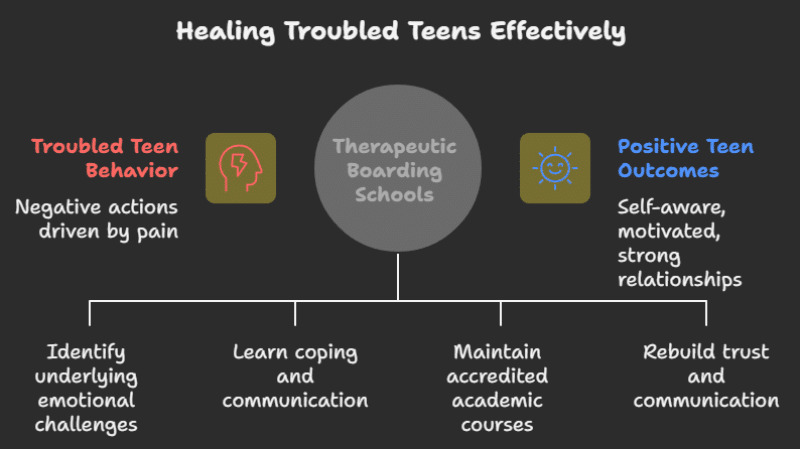When parents search for ways to help their struggling teen, two terms often appear: Therapeutic Boarding Schools and Reform Schools. While both aim to support troubled youth, the approach, environment, and outcomes they offer are very different.
The short answer?
If your teen is facing emotional, behavioral, or mental health struggles, a Therapeutic Boarding School for Troubled Teens is typically the better choice. Reform schools, on the other hand, are more correctional in nature — focusing on discipline and structure rather than therapy and healing.
Let’s explore these differences more deeply so you can make an informed decision for your family.
Key Takeaways
- Therapeutic Boarding Schools for Troubled Teens emphasize emotional healing, therapy, and family involvement.
- Reform Schools focus primarily on discipline and behavior correction.
- Licensed therapists and personalized treatment plans are the foundation of therapeutic programs.
- Utah offers some of the most reputable and accredited therapeutic boarding options in the country.
- Transitional and “failure to launch” programs help graduates maintain progress and independence.
What Is a Therapeutic Boarding School?
Therapeutic Boarding Schools for Troubled Teens combine academics, emotional therapy, and life skills training in a structured, supportive environment. These schools are designed for adolescents who may be dealing with:
- Depression or anxiety
- Low self-esteem
- Family conflict
- Behavioral issues
- Trauma or emotional distress
- Academic underachievement
Key Characteristics:
- Licensed Therapy: Students work with licensed therapists through individual, group, and family counseling.
- Personal Growth Focus: Programs encourage self-awareness, accountability, and confidence-building.
- Academic Recovery: Teens can continue their education while addressing emotional and behavioral challenges.
- Family Involvement: Parents are active participants through regular communication and therapy sessions.
In states like Utah, many reputable therapeutic programs provide a safe environment where students can heal and learn skills for long-term success.
What Is a Reform School?
Reform schools (sometimes called “juvenile reform institutions”) originated as correctional facilities for minors exhibiting delinquent or unlawful behavior. While modern versions may be less punitive than in the past, their primary purpose remains behavior modification through discipline and structure — not therapy.
Key Characteristics:
- Rule Enforcement: Focuses on compliance and correction of behavior.
- Limited Emotional Therapy: Counseling may be available, but it’s not the program’s core.
- Institutional Setting: These programs often resemble detention centers more than schools.
- Short-Term Results: Discipline may temporarily correct surface behavior, but it rarely addresses root causes.
Comparing Therapeutic Boarding Schools vs. Reform Schools
Here’s a simple breakdown of how the two models differ in purpose, environment, and long-term outcomes:
| Category | Therapeutic Boarding Schools | Reform Schools |
|---|---|---|
| Primary Goal | Emotional healing, academic growth, personal development | Behavior correction, discipline |
| Approach | Therapy-based (CBT, DBT, family therapy) | Strict routines and disciplinary systems |
| Environment | Supportive, home-like, emotionally safe | Institutional, rule-driven |
| Staff | Licensed therapists, counselors, educators | Correctional officers, instructors |
| Parental Involvement | High — parents are part of treatment | Limited — focus remains on student compliance |
| Best For | Teens with emotional or behavioral struggles | Teens with chronic defiance or legal troubles |
| Long-Term Results | Improved mental health, stronger family bonds, academic progress | Short-term compliance, risk of relapse |
Why Therapeutic Boarding Schools Are More Effective for Troubled Teens
Therapeutic boarding schools emphasize healing, not punishment. Teens are taught to understand the “why” behind their actions — helping them grow emotionally rather than just follow rules.
1. Root Cause Focus
Therapists work one-on-one to identify underlying emotional pain, trauma, or mental health challenges that drive negative behavior.
2. Skill Development
Students learn coping strategies, communication skills, and emotional regulation techniques that last beyond the program.
3. Academic Continuity
Unlike reform schools, therapeutic programs maintain accredited academic courses, allowing students to stay on track for graduation.
4. Family Reconnection
Family therapy sessions rebuild trust, improve communication, and prepare everyone for the teen’s reintegration at home.
5. Lasting Impact
Graduates often leave with better self-awareness, stronger relationships, and renewed motivation to succeed.

The Role of Licensed Therapists and Clinical Staff
One of the main differences between Therapeutic Boarding Schools for Troubled Teens and reform institutions is the presence of licensed mental health professionals.
Therapists use proven methods like:
- Cognitive Behavioral Therapy (CBT) – to reframe negative thinking patterns
- Dialectical Behavior Therapy (DBT) – to manage emotional intensity and impulsivity
- Family Therapy – to restore parent-teen relationships
This clinical support ensures that emotional struggles are treated with compassion and professionalism rather than punishment.
How Utah Programs Lead in Therapeutic Care
Utah has become a national hub for therapeutic boarding schools due to its vast natural environment, strong educational standards, and high concentration of licensed programs.
Programs in Utah often integrate outdoor therapy, experiential learning, and transitional support — helping students apply what they’ve learned in real-world settings.
For families considering next steps after treatment, Utah also offers Failure to Launch Programs for young adults who need continued guidance. These programs focus on:
- Building independence
- Strengthening decision-making skills
- Supporting emotional regulation
- Helping with college or job readiness
This continuum of care helps ensure long-term success beyond boarding school.
Conclusion: Choose Healing Over Punishment
When your teen is struggling, it’s easy to feel lost between choices that promise structure and those that offer healing. But true, lasting change doesn’t come from punishment — it comes from understanding, therapy, and guided growth.
Therapeutic Boarding Schools for Troubled Teens create an environment where emotional recovery and personal development go hand in hand.
If your family is exploring options for your child’s recovery and education, you don’t have to decide alone.
👉 Contact Help Your Teen Now to help your teen now.
Our team can connect you with accredited, compassionate programs that prioritize healing, education, and long-term transformation.






0 Comments